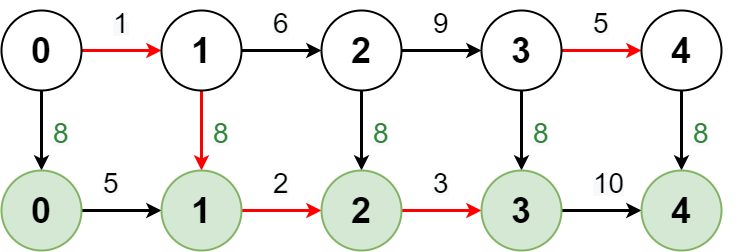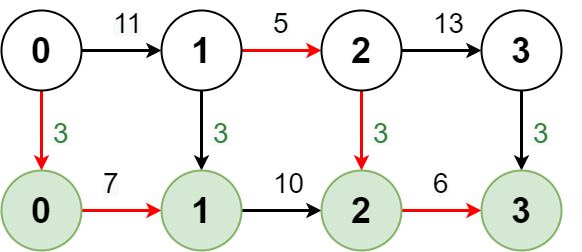Classic Dynamic Programming II
Hard Leetcode problems often require a DP solution. This one is no different. The DP min formula is actually fairly simple, the complication is: do we simulate the train going thru the regular path first, or going thru the expression path first? Answer: try both, pick the min from them. Code is down below, cheers, ACC.
Minimum Costs Using the Train Line - LeetCode
A train line going through a city has two routes, the regular route and the express route. Both routes go through the same n + 1 stops labeled from 0 to n. Initially, you start on the regular route at stop 0.
You are given two 1-indexed integer arrays regular and express, both of length n. regular[i] describes the cost it takes to go from stop i - 1 to stop i using the regular route, and express[i] describes the cost it takes to go from stop i - 1 to stop i using the express route.
You are also given an integer expressCost which represents the cost to transfer from the regular route to the express route.
Note that:
- There is no cost to transfer from the express route back to the regular route.
- You pay
expressCostevery time you transfer from the regular route to the express route. - There is no extra cost to stay on the express route.
Return a 1-indexed array costs of length n, where costs[i] is the minimum cost to reach stop i from stop 0.
Note that a stop can be counted as reached from either route.
Example 1:

Input: regular = [1,6,9,5], express = [5,2,3,10], expressCost = 8 Output: [1,7,14,19] Explanation: The diagram above shows how to reach stop 4 from stop 0 with minimum cost. - Take the regular route from stop 0 to stop 1, costing 1. - Take the express route from stop 1 to stop 2, costing 8 + 2 = 10. - Take the express route from stop 2 to stop 3, costing 3. - Take the regular route from stop 3 to stop 4, costing 5. The total cost is 1 + 10 + 3 + 5 = 19. Note that a different route could be taken to reach the other stops with minimum cost.
Example 2:

Input: regular = [11,5,13], express = [7,10,6], expressCost = 3 Output: [10,15,24] Explanation: The diagram above shows how to reach stop 3 from stop 0 with minimum cost. - Take the express route from stop 0 to stop 1, costing 3 + 7 = 10. - Take the regular route from stop 1 to stop 2, costing 5. - Take the express route from stop 2 to stop 3, costing 3 + 6 = 9. The total cost is 10 + 5 + 9 = 24. Note that the expressCost is paid again to transfer back to the express route.
Constraints:
n == regular.length == express.length1 <= n <= 1051 <= regular[i], express[i], expressCost <= 105
public long[] MinimumCosts(int[] regular, int[] express, int expressCost)
{
long[] minRegular = new long[regular.Length + 1];
long[] minExpress = new long[express.Length + 1];
minRegular[0] = 0;
minExpress[0] = expressCost;
for (int i = 1; i < minRegular.Length; i++)
{
minRegular[i] = 100000L * 100000 + 7;
minExpress[i] = 100000L * 100000 + 7;
}
long[] retVal = new long[regular.Length];
for (int i = 1; i < minRegular.Length; i++)
{
//Case 1: assume the path jumps from i-1 to i thru regular path first
long tempMinRegular1 = Math.Min(minRegular[i - 1] + regular[i - 1], minExpress[i]);
long tempMinExpress1 = Math.Min(minExpress[i - 1] + express[i - 1], tempMinRegular1 + expressCost);
//Case 2: assume the path jumps from i-1 to i thru express path first
long tempMinExpress2 = Math.Min(minExpress[i - 1] + express[i - 1], minRegular[i] + expressCost);
long tempMinRegular2 = Math.Min(minRegular[i - 1] + regular[i - 1], tempMinExpress2);
//Get the best out of case 1 and case 2 for both regular and express
minRegular[i] = Math.Min(tempMinRegular1, tempMinRegular2);
minExpress[i] = Math.Min(tempMinExpress1, tempMinExpress2);
//Get the best out of regular and express
retVal[i - 1] = Math.Min(minRegular[i], minExpress[i]);
}
return retVal;
}




Comments
Post a Comment